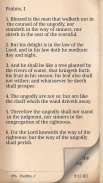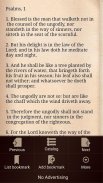




Bible - Psalms

توضیحات Bible - Psalms
Psalms
The Book of Psalms (Hebrew: תְּהִלִּים or תהילים Tehillim meaning "Praises"), commonly referred to simply as Psalms or "the Psalms", is the first book of the Ketuvim ("Writings"), the third section of the Hebrew Bible. The English title is from the Greek translation, ψαλμοί psalmoi, meaning "instrumental music" and, by extension, "the words accompanying the music." There are 150 psalms in the Jewish and Western Christian tradition (more in the Eastern Christian churches), many of them linked to the name of King David, but his authorship is not accepted by most modern Bible scholars.
Benedictions and superscriptions
The Book of Psalms is divided into five sections, each closing with a doxology (i.e., a benediction) – these divisions were probably introduced by the final editors to imitate the five-fold division of the Torah:
Book 1 (Psalms 1–41)
Book 2 (Psalms 42–72)
Book 3 (Psalms 73–89)
Book 4 (Psalms 90–106)
Book 5 (Psalms 107–150)
Many psalms (116 of the 150) have individual superscriptions (titles), ranging from lengthy comments to a single word. Over a third appear to be musical directions, addressed to the "leader" or "choirmaster," including such statements as "with stringed instruments" and "according to lilies." Others appear to be references to types of musical composition, such as "A psalm" and "Song," or directions regarding the occasion for using the psalm ("On the dedication of the temple," "For the memorial offering," etc.). Some carry the names of individuals, the most common being David, and thirteen of these relate explicitly to incidents in the king's life.
Overview
Individual psalms were originally hymns, to be used on various occasions and at various sacred sites; later, some were anthologised, and might have been understood within the various anthologies (e.g., ps.123 as one of the Psalms of Ascent); finally, individual psalms might be understood within the Psalter as a whole, either narrating the life of David or providing instruction like the Torah. In later Jewish and Christian tradition, the psalms have come to be used as prayers, either individual or communal, as traditional expressions of religious feeling.
مزامیر
کتاب مزامیر (عبری: תְּהִלִּים یا תהילים Tehillim به معنی "ستایش")، معمولا به سادگی به عنوان مزامیر یا "مزامیر"، اولین کتاب از Ketuvim ("نوشته")، بخش سوم از کتاب مقدس عبری است. عنوان انگلیسی از ترجمه یونانی، psalmoi ψαλμοί، به معنی "موسیقی های بدون کلام" و، با گسترش، است "کلمات همراه با موسیقی است." 150 مزامیر در سنت مسیحی یهودی و غربی (بیشتر در کلیساهای مسیحی شرقی)، بسیاری از آنها را مرتبط با نام شاه دیوید وجود دارد، اما نویسندگی خود است که توسط بسیاری از پژوهشگران معاصر کتاب مقدس پذیرفته نیست.
Benedictions و superscriptions
کتاب مزامیر به پنج بخش تقسیم شده است، هر یک از بسته شدن با ستایش (به عنوان مثال، یک نیایش) - این بخش احتمالا توسط ویراستاران نهایی معرفی شدند به تقلید از تقسیم به پنج برابر از تورات:
کتاب 1 (مزامیر 1-41)
کتاب 2 (مزامیر 42-72)
کتاب 3 (مزامیر 73-89)
کتاب 4 (مزامیر 90-106)
کتاب 5 (مزامیر 107-150)
بسیاری از مزامیر (116 از 150) داشته superscriptions فردی (عنوان)، اعم از نظرات طولانی به یک کلمه. بیش از یک سوم به نظر می رسد جهت موسیقی، خطاب به "رهبر" و یا "رهبر گروه کر،" از جمله تونستید جمله هایی مثل "با سازهای زهی" و "با توجه به نیلوفرهای." دیگر به نظر می رسد اشاره به نوع ترکیب موسیقی، مانند "A مزمور" و "آهنگ"، و یا جهت با توجه به فرصتی برای استفاده از مزامیر ("از خود گذشتگی از معبد"، "برای ارائه یادبود،" و غیره ). برخی از حمل به نام از افراد، که رایج ترین آنها دیوید و سیزده از این مربوط به صراحت به حوادث در زندگی شاه.
هفتگی
مزامیر فردی در اصل سرودهای، به مناسبت های مختلف و در سایت های مختلف مقدس مورد استفاده قرار گیرد بودند. بعد، برخی، anthologised شد و ممکن است در گلچین های ادبی مختلف (به عنوان مثال، ps.123 به عنوان یکی از مزامیر از صعود) درک شده است؛ در نهایت، مزامیر فرد ممکن است در زبور به عنوان یک کل درک، یا روایت زندگی دیوید و یا ارائه آموزش های مانند تورات. در سنت های یهودی و مسیحی بعد، مزامیر آمده اند به عنوان نماز، چه به صورت فردی و یا جمعی، استفاده می شود به عنوان عبارات سنتی احساس مذهبی.
























